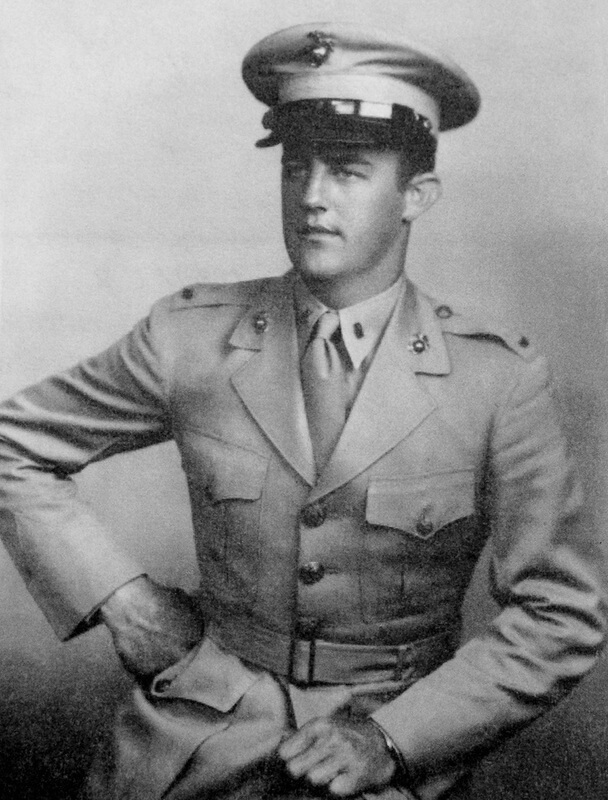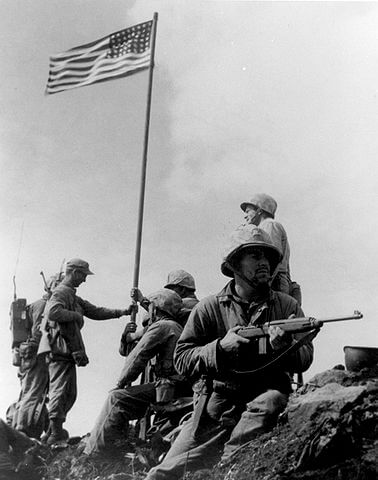Ricochet is the best place on the internet to discuss the issues of the day, either through commenting on posts or writing your own for our active and dynamic community in a fully moderated environment. In addition, the Ricochet Audio Network offers over 50 original podcasts with new episodes released every day.
 Give Me 50 Marines Not Afraid to Die
Give Me 50 Marines Not Afraid to Die
 He thought it was a suicide mission. A full frontal attack on Mount Suribachi without supporting fire? He would not order his men up the mountain, but he would lead them. Raising his rifle above his head he climbed out of the foxhole and his men followed.
He thought it was a suicide mission. A full frontal attack on Mount Suribachi without supporting fire? He would not order his men up the mountain, but he would lead them. Raising his rifle above his head he climbed out of the foxhole and his men followed.
First Lieutenant John Keith Wells did not make it to the top, but his Marines did two days later. The leader of 3rd Platoon, E Company, 2nd Battalion, 28th Marines died on February 11th in Denver. He was 94.
The citation on his Navy Cross reads thus:
When ordered to attack across open terrain and dislodge the enemy from a series of strongly-defended pillboxes and blockhouses at the base of Mount Suribachi, First Lieutenant Wells placed himself in the forefront of his platoon and, leading his men forward in the face of intense hostile machine-gun, mortar and rifle fire, continuously moved from one flank to the other to lead assault groups one by one in their attacks on Japanese emplacements. Although severely wounded while directing his demolition squad in an assault on a formidable enemy blockhouse whose fire had stopped the advance of his platoon, he continued to lead his men until the blockhouse was destroyed. When, an hour later, the pain from his wound became so intense that he was no longer able to walk, he established his command post in a position from which to observe the progress of his men and continued to control their attack by means of messengers. By his courageous leadership and indomitable fighting spirit, First Lieutenant Wells contributed materially to the destruction of at least twenty-five Japanese emplacements, and his unwavering devotion to duty was in keeping with the highest traditions of the United States Naval Service.

After Wells was wounded, 1st Lt. Harold Scarier took command of 3rd Platoon, who raised the first flag on Mt. Suribachi. It was subsequently replaced by a larger, more famous flag.
In 1995 he wrote a memoir, Give Me 50 Marines Not Afraid to Die.
Said his daughter, Connie, “He honored and loved the Marine Corps with all his heart and soul. He loved his family and his last words were, ‘My family.’”
Fair winds and following seas, marine. Join the ranks guarding the streets of Heaven.
Published in History, Military



i defer to your grandfather’s direct experience. But a lot of what passes as historical evaluation is in fact so much navel gazing.
This is why I should just post in the PIT. Sorry to have bothered you.
The thing about it isn’t the strategy done by the higher -ups. Right or wrong, smart, clever, insane, hubristic, catastrophic – none of that matters to the men getting deposited into a maelstrom not of their own choosing.
So those men went and did what they had to do, when they had to do it, and if effete “men” with patches on the elbows of their jackets want to question the strategy and not recognize the individuals who executed it regardless of the brilliance or stupidity of the strategists, then they should be slapped hard with a wet cod repeatedly until they at least realize that it’s always the grunt that bears the burden, and gets it done, but is almost always historically anonymous.
I hope I started out by saying that I admire and honor the heroism of the great men who risked everything for that which is right and good and honorable.
Because I do. With all my heart, I am full of praise and thanksgiving for those who fought so that we could live.
I don’t remember if it was Okinawa or Iwo, but I’ve read that the number of airmen’s lives saved by having a place to land exceeded the number of lives lost in the invasion.
I can’t look at the history and sort it out. My judgment is too colored by the fact that I just hate MacArthur so much. Whatever the appropriateness of the strategy was, I submit that that egomaniacal, grandstanding SOB did not hesitate to spend lives freely to enrich his fame.
bypassing all the hindsight strategery and getting back to the point of the original post . . . Semper Fi.
Just because when MacArthur died, and went to heaven, he marched up to God, saluted, and said “Relieving you sir?”
Let’s at least add MacArthur was serious about the Cold War; let’s at least add he did grewat by America in ruling Japan!
Let’s just say that there was a reason that his staffers referred to him as “Sarah.” (As in Sarah Bernhardt.)
Military men do not tend to be introspective and humble. For every Eisenhower and Bradley there is a MacArthur and Patton.
MacArthur was ridiculed by many for buggering out of the Philippines. “Old Dugout Doug,” they called him. But there was also interservice rivalries involved there. The war in the Pacific, many thought, should have been the reserve of the Navy. I know Marines prefer to be led by Marines.
MacArthur was better in the post-war period for Japan.
Restated: ‘Our winningest generals we don’t like, you know, as human beings.’